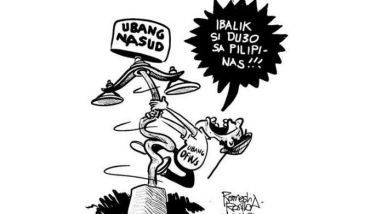Tax planning your excess tax credits
(Part I)
Strategy without tactics is the slowest route to victory. Tactics without strategy is the noise before defeat. -Sun Tzu.
December, for most people, means that it’s Christmas time once again. But for some, December marks the end of the calendar year for tax and financial accounting purposes. This would be the best time to strategize and plan not only things of merry but also one’s tax liabilities upon the close of books of accounts.
The power to tax is occasionally called the power to destroy. This is due to the fact that taxation interferes with a taxpayer’s personal and property right and takes away a portion of that property. Because of this burden imposed upon the taxpayers, the law makes available several remedies to ease the rigors of tax. Subject to certain limitations, it is upon each taxpayer to fully utilize its available remedies through careful tax planning.
The filing with the Bureau of Internal Revenue (BIR) of a written claim for tax credit or tax refund is one remedy granted by law. The remedy of claiming refund or credit may be availed in cases of erroneous payment of tax, illegally collected tax, where a VAT-registered person, at the end of any taxable period, incurs excess input VAT attributable to its zero-rated sales, or where a taxpayer at the end of the taxable year has excess withholding tax credits. Applications for Tax Credit Certificates (TCC), rather than refund, are usually resorted to by taxpayer for the practical reason that the chances for getting credits are higher as it would not involve determination of whether the BIR has funds. A TCC is a certification acknowledging the entitlement of the taxpayer to tax credit. Where a TCC is validly issued, it is effective for a period of five years from the date of issue and may be revalidated for another five years, and may be used in the payment of the taxpayer’s direct internal revenue liability. However, a TCC cannot be used in the payment of any kind of withholding tax, availment of tax amnesty, payment of compromise penalties and deposits on withdrawal of excisable articles.
Under earlier revenue regulations, a taxpayer who holds TCCs has the option to sell or transfer them in situations where the taxpayer finds no use for the TCCs or when the taxpayer finds it more important to convert the TCCs to cash, to answer immediate liquidity problems. Perhaps TCCs may be considered tantamount to a mere scrap of paper in such instances and it is clearly a bad business judgment to forfeit a receivable which may involve millions of pesos. With the option to sell or transfer, the seller, depending on its business requirements, could quickly generate cash for the use in its operations as TCCs are commonly sold at a discounted price. The buyer on the other hand, can utilize every peso of TCC at a lesser cost arising from the discount the seller grants.
This right to transfer was previously granted to taxpayers by Revenue Regulations No. 5-00 (RR No. 05-00) provided that the transfer must be with prior approval of the Commissioner of Internal Revenue or his duly authorized representative; the transfer should be limited to one transfer only; and the transferee shall use the TCC assigned to it strictly in payment of its direct internal revenue tax liability and in no case shall the same be available for conversion to cash in its hands.
This right granted by RR No. 05-00 coincides with the property rights of a person. The right to property includes the right to enjoy the use, possession, and the fruits of the property as well as the right to dispose, vindicate and exclude another. In fact, the BIR has previously recognized that the taxpayer as owner of the TCC has the exclusive right to enjoy and dispose of the certificate according to its wishes. It explained in a particular ruling that the fact that a taxpayer can ultimately dispose of the cash proceeds of its TCCs when converted to cash, there is no reason why the source of such proceeds (being the TCCs) should be treated differently.
However, contrary to this reasoning, the BIR has issued Revenue Regulations No. 14-11 (RR No 14-11), dated July 29, 2011, revoking the transferability of the TCC.
(To be continued)
Katrina Monserrat F. Aznar is a supervisor of tax of Manabat Sanagustin & Co., CPAs, a member firm of the KPMG network of independent member firms affiliated with KPMG International Cooperative (KPMG International), a Swiss entity.
The views and opinions expressed herein are those of the author and do not necessarily represent the views and opinions of KPMG in the Philippines. For comments or inquiries, please email manila@kpmg.com or kaznar@kpmg.com.
- Latest
- Trending



























